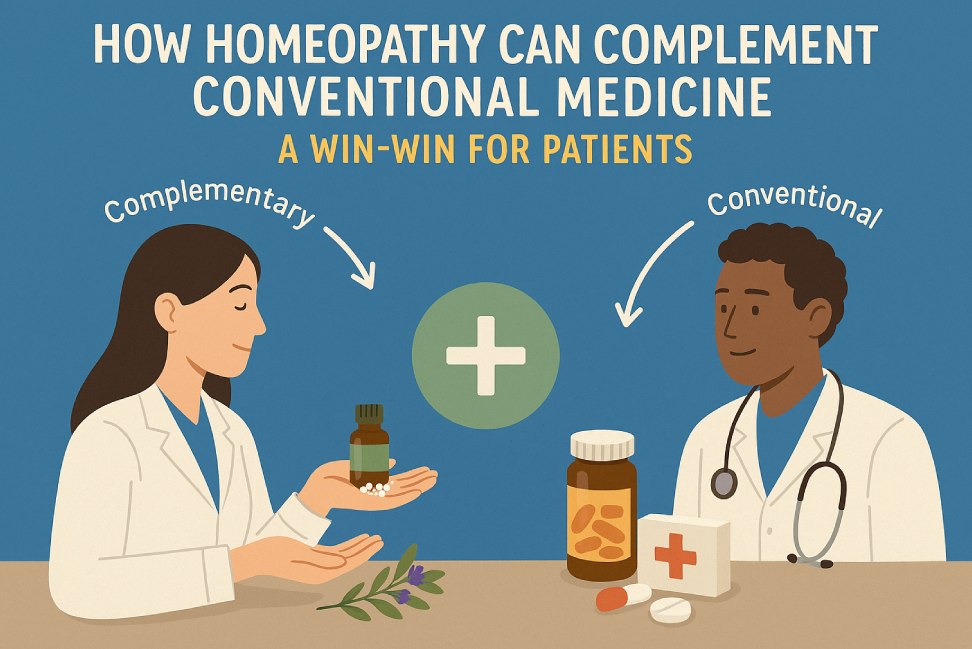In today's healthcare landscape, many individuals are seeking approaches that integrate the best of both worlds—modern medicine and holistic healing. This is where homeopathy can play a beautiful supportive role. Often misunderstood as an alternative to conventional treatment, homeopathy is, in fact, remarkably effective when used complementarily, especially for chronic conditions and long-term health support.
Working Together, Not Against
Conventional medicine works precisely in managing emergencies, and specific biochemical imbalances through targeted pharmaceutical intervention. Homeopathy, on the other hand, works on a different plane—it seeks to stimulate the body's innate healing intelligence by balancing the vital force. Stress and trauma always affect the vital force first; which is then manifested in the body as signs and symptoms that the patient reports as "illness". To treat an illness, it is the vital force that needs to be balanced first, and this is what homeopathy strives to do.
When a person is undergoing treatment with conventional medication, homeopathy does not interfere with the action of the drugs. This is because homeopathic remedies work at the subtle, energetic level. Conventional medicine manages the outward symptoms, while homeopathy quietly works at the root, enhancing the body's resilience and supporting emotional and energetic balance.
Bridging Gaps in Chronic Conditions
This collaborative approach is especially useful in chronic conditions, where long-term medication is often required.
Take thyroid conditions such as hypothyroidism, for example. This is a condition where the thyroid gland is not producing sufficient levels of thyroid hormones to meet the body's needs. Synthetic hormone replacement with thyroxine is then necessary to maintain the required hormone levels. However, patients may continue to experience fatigue, mood swings, or a low mood even after taking the medication because the underlying imbalance of the vital force is still there. Homeopathy can offer support by working to strengthen the individual's overall constitution and restoring internal harmony at the energetic level. Once improvements in mood, metabolism, and energy levels are experienced, the patient can then slowly taper off the medication under the guidance of their medical doctor.
In respiratory ailments such as asthma or chronic bronchitis, conventional medications provide relief from wheezing and shortness of breath. However, recurring flare-ups may occur with exertion or stress, and a lot of patients also experience a sense of anxiety. When helping patients with respiratory ailments, I first assess the individual's symptoms, medical history, and any mental or emotional stressors. Based on this, I prescribe a remedy that addresses the full range of the patient's symptoms, especially focusing on the mind and emotions. The goal is to bring balance from within. When approached in this manner, homeopathy can reduce the patient's susceptibility to respiratory attacks over time, while the patient remains reassured that their conventional medications are available for use in emergencies.
For skin conditions like eczema or acne, steroid creams, and antibiotics manage the inflammation and itching effectively—but relapses are common, especially when the patient stops using the medication. Homeopathy delves deeper, seeking to correct the underlying imbalance that is causing the skin to react in the first place. Over time, this can lead to more sustained improvement, especially when used alongside conventional care.
An Integrative Model for True Healing
What makes homeopathy so compatible with conventional treatment is its non-invasive and individualised approach. It does not override or suppress symptoms; instead, it works with the body's natural processes.
Additionally, many patients find that homeopathy fits naturally into a broader wellness plan that may include nutrition, mindfulness practices, and yoga. These natural therapies can further support the healing journey, but I have found that it is the homeopathic remedy that often acts as a catalyst for deeper healing.
Conclusion: Harmony in Healing
Rather than choosing between homeopathy and conventional medicine, more people are embracing both approaches. Homeopathy offers a gentle but profound pathway to healing that works together with mainstream medical treatments. When used thoughtfully and under professional guidance, homeopathy helps to restore balance at all levels—physical, emotional, and energetic—while modern medicine continues to provide essential support in managing symptoms and protecting health.
The future of medicine may well lie in this kind of collaboration, where therapies such as homeopathy and modern science meet—not in conflict, but in complement.





